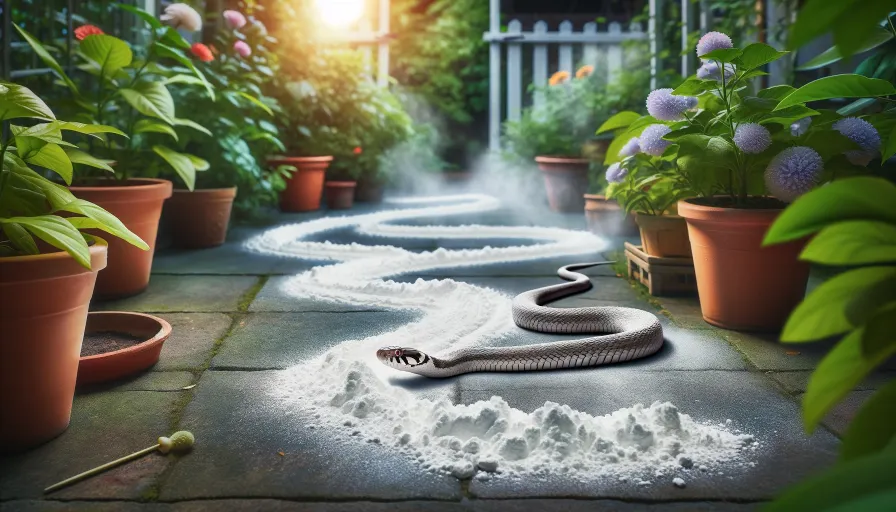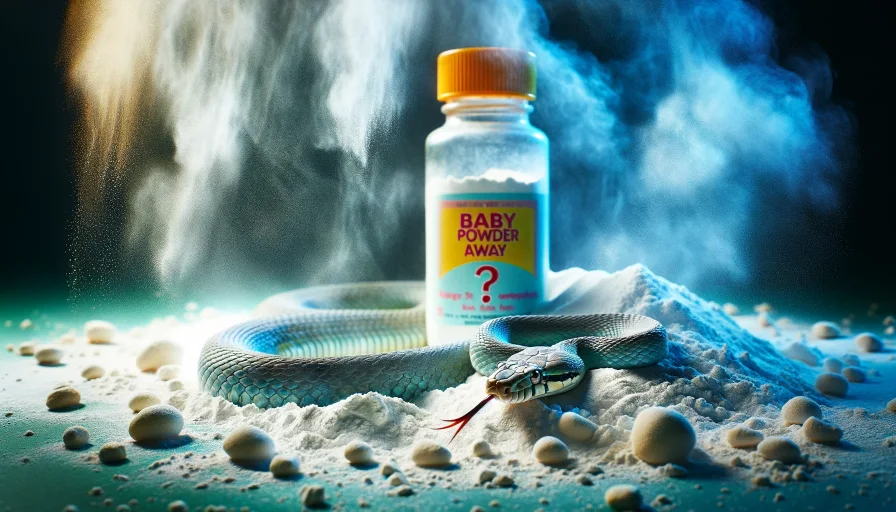
Imagine a simple household item that could potentially repel snakes from invading your home and yard.
Sounds too good to be true, right? Well, the question arises – does baby powder have the power to keep snakes away?
Whether you’re a snake-phobic homeowner or simply curious about the effectiveness of this unconventional method, we’ll explore the truth behind this notion and shed some light on whether baby powder is indeed a reliable snake deterrent.
Understanding the threat of snakes
Different species of snakes
Snakes are a diverse group of reptiles with thousands of different species found all over the world.
Some common species include the rattlesnake, copperhead, and cottonmouth in North America, the black mamba in Africa, and the king cobra in Asia.
Each species of snake has its own unique characteristics and behaviors, which play a role in determining the level of threat they pose to humans.
The dangers of venomous snakes
One of the primary concerns when it comes to snakes is the presence of venomous species.
Venomous snakes inject venom into their prey, which can cause severe health issues or even death in humans if bitten.
It is essential to be able to identify venomous snakes and understand the appropriate actions to take in case of an encounter.
Common snake habitats
Snakes can be found in various habitats, ranging from forests and grasslands to deserts and swamps.
They are particularly attracted to areas with abundant food sources, such as rodents, birds, and amphibians.
Understanding the typical habitats of snakes can help individuals take preventive measures to reduce the likelihood of encountering them.
Exploring the myth of baby powder as a snake deterrent
Origins of the belief
The belief that baby powder can repel snakes is rooted in folklore and anecdotes passed down through generations.
It is often claimed that snakes dislike the scent or texture of baby powder and will avoid areas where it is present.
However, it is important to distinguish between folklore and scientific evidence when evaluating the effectiveness of snake repellents.
Lack of scientific evidence
Despite the widespread belief in baby powder as a snake deterrent, there is a lack of scientific research supporting this claim.
No published studies have provided conclusive evidence that baby powder effectively repels snakes or alters their behavior.
It is crucial to rely on scientific evidence rather than hearsay when addressing potential snake repellents.
Potential reasons for the belief
The belief in baby powder as a snake deterrent may have originated from various factors.
Firstly, baby powder has a distinct fragrance that some individuals may find unpleasant, leading them to believe that snakes would also feel the same way.
Additionally, the fine texture of baby powder may create an uncomfortable sensation for snakes, potentially causing them to avoid areas where it is applied.
Examining the effectiveness of baby powder in repelling snakes
Characteristics of snakes’ sensory systems
To determine the effectiveness of baby powder as a snake deterrent, it is necessary to understand snakes’ sensory systems.
Snakes rely heavily on their sense of smell and their ability to detect pheromones in their environment.
However, they primarily use their Jacobson’s organ, located in the roof of their mouths, to gather sensory information rather than relying on their skin or nostrils.
Lack of deterrent properties in baby powder
Baby powder does not possess any inherently repellent properties against snakes. Its composition primarily consists of talc or cornstarch, which do not emit any odors or substances known to repel snakes.
Without active ingredients specifically designed to deter snakes, it is unlikely that baby powder will have any significant impact in keeping them away.
Studies and experiments conducted
Several studies and experiments have been conducted to test the effectiveness of various snake repellents, including baby powder.
These experiments typically involve observing snake behavior in the presence or absence of the repellent substance.
In the case of baby powder, no substantial evidence has been found to support its efficacy in repelling snakes.
Alternative snake repellents and prevention methods
Natural remedies and plants
Certain plants and natural remedies are believed to have repellent properties against snakes.
These include plants such as marigolds, garlic, and lemongrass, which are said to emit scents that deter snakes.
However, the effectiveness of these remedies is still debated, and individuals should approach them with caution and conduct further research.
Chemical snake repellents
Chemical snake repellents are commercially available products designed to deter snakes from entering specific areas.
These products often contain substances such as naphthalene or sulfur, which are believed to create odors snakes find unpleasant.
When using chemical repellents, it is crucial to follow the manufacturer’s instructions and consider potential environmental impacts.
Home and yard modifications
Preventing snakes from entering homes and yards is an effective way to reduce encounters.
Some preventive measures include ensuring gaps around doors and windows are sealed, covering crawl spaces and vents, and removing debris or woodpiles where snakes may seek shelter.
Modifying the environment to make it less attractive to snakes can significantly reduce the likelihood of encounters.
Safety concerns and risks associated with baby powder

Health risks for humans and pets
While the use of baby powder might not deter snakes as initially believed, it is essential to consider the potential health risks associated with its use.
Baby powder can be harmful if inhaled in significant quantities, potentially causing respiratory issues.
Additionally, pets may accidentally ingest the powder, leading to health problems. It is crucial to prioritize safety when dealing with potential snake deterrents.
Environmental impact
Another aspect to consider is the environmental impact of using baby powder as a snake deterrent.
Baby powder is often packaged in plastic containers, contributing to plastic waste. Additionally, the talc or cornstarch in baby powder may have adverse effects on the environment if it enters water sources or ecosystems.
Opting for environmentally friendly alternatives is a responsible choice.
Proper usage of baby powder
If individuals still wish to use baby powder as a snake deterrent, it is important to take precautions.
Applying baby powder in areas where snakes are commonly found, such as around doorways or in outdoor living spaces, may help create a barrier.
However, it is crucial to use it sparingly and avoid excessive application to minimize potential risks associated with inhalation or ingestion.
Practical steps to reduce snake encounters
Maintaining a tidy yard
Keeping a tidy yard is key to reducing snake encounters. Regularly mowing the lawn, removing stray leaves or debris, and trimming overgrown vegetation can eliminate potential hiding spots for snakes.
By maintaining a clean environment, individuals can discourage snakes from taking up residence in their yards.
Removing potential snake shelters
Snakes are attracted to areas with ample hiding spots and shelter, such as woodpiles, stacks of bricks or rocks, and piles of brush.
Removing these potential shelters from the yard can greatly reduce the likelihood of snakes choosing to inhabit the area.
Disrupting their habitat makes the environment less appealing for snakes.
Educating oneself about local snake species
Understanding the types of snakes commonly found in the local area is crucial for maintaining safety.
By familiarizing yourself with their appearance and behavior, you can better identify venomous snakes and take appropriate precautions.
Local wildlife organizations or herpetological societies can provide valuable information and resources for learning about native snake species.
Dealing with snake encounters
Remain calm and avoid sudden movements
In the event of a snake encounter, it is essential to remain calm and avoid making sudden movements.
Snakes typically prefer to avoid confrontation and will only bite in self-defense. By staying calm, you reduce the chances of startling the snake and triggering a defensive response.
Identifying venomous snakes
Being able to identify venomous snakes is crucial for personal safety. Venomous snakes often have distinctive features such as triangular heads, vertical pupils, and venomous fangs.
It is important to familiarize yourself with these characteristics and seek professional help or guidance if encountering a potentially venomous snake.
Seeking professional assistance
If you encounter a snake and are unsure of its species or if it poses a threat, it is always best to seek professional assistance.
Contacting a local animal control or wildlife conservation organization will ensure that the snake is handled safely and appropriately.
It is never recommended to attempt to handle or capture a snake without proper knowledge or training.
Misconceptions and facts about snakes
Snakes as beneficial creatures
Contrary to popular belief, snakes play a crucial role in ecosystems and can be incredibly beneficial.
They help control rodent populations, as many snakes thrive on a diet of small mammals.
Additionally, snakes are an important part of the food chain and contribute to overall biodiversity. It is important to respect their place in the natural world.
Myths about snake behavior
There are numerous myths and misconceptions surrounding snake behavior, perpetuating fear and misunderstanding.
One common myth is that snakes are aggressive and seek out human interaction. In reality, snakes typically prefer to avoid humans and will only bite in self-defense.
Understanding snake behavior can help dispel these unfounded beliefs.
Understanding their role in ecosystems
Snakes are integral to maintaining the balance of ecosystems. As predators, they help regulate populations of prey species, preventing overpopulation and maintaining the health of ecosystems.
By eating rodents and other small animals, snakes contribute to the overall ecological equilibrium.
Recognizing their ecological importance is crucial for their conservation and protection.
Final Thoughts
While the belief that baby powder repels snakes may persist, scientific evidence does not support this claim.
Snakes have unique sensory systems, and their behavior is not influenced by the use of baby powder.
Instead, individuals should consider alternative snake repellents and prevention methods, prioritize safety, and take practical steps to reduce snake encounters.
By understanding snakes’ role in ecosystems and dispelling misconceptions, we can coexist with these remarkable creatures and appreciate their important contributions to the natural world.



